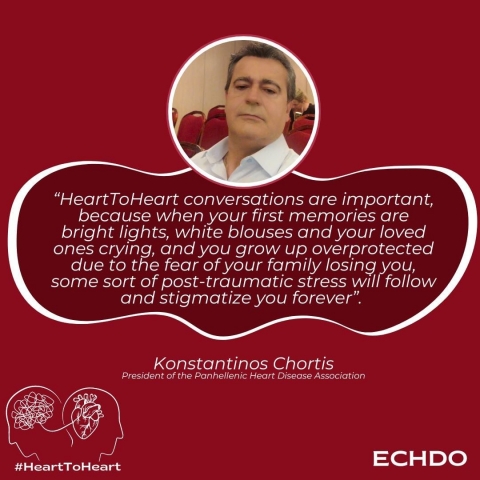Dear patients, dear friends,
I’ ve decided to write down and share my personal story with you, just to highlight certain points which I believe are crucial and of course relevant. It is up to you whether you publish, edit or dismiss it altogether. You can use my name, I do not mind at all, just the opposite.
Well, I’ m Konstantinos Chortis, born in 1969, in Australia. I grow up in my homeland, Greece, and on a small but well known to the visitors from Europe island (Leykada).
At the time of my birth there were no signs of something going wrong on or of some sort of illness. No symptoms, just a healthy male baby. What a joy a brought to my parents (I was their first child).This didn’t last for long. Soon everybody could see that something was wrong. I was weak, impossible to gain weight, my appetite was below zero, I had fever all the time and shortness of breath. I was admitted to a hospital or medical facility by my mom. Bad news : serious ventricular septal defect and a cleft, quite sizable, on my mitral valve. After a while as advised my parents had a meeting at the Royal Alexandra’s Hospital, in Sydney, with the best heart surgeon at the time in the country : Dr. Curtmill. Tall, reddish and bearded. I still remember his face. After the catheterization process (scary and painful, I’d say) the verdict clear : whether we operate on the boy, with a 50% chance of survival, or it turns blue and dies soon after. My parents were devastated but they had no choice.
So I underwent a difficult and risky procedure (remember the timeframe, it is 1972) . My guardian angel prevailed: luckily, I survived and at first everybody felt really excited. And relieved. “The boy will live”.
That didn’t last for long. I kept feeling weak and still could not gain any weight at all. So, back to the hospital. After the necessary examinations, my parents were informed by the same doctor about the fact that regretfully it was not a 100% success due to placing the stitches not as close as they should be. The surgeon assumed full responsibly and apologized, which till this day I deeply appreciate. After all, he did his best and no malpractice took place. As a result, my diagnosis still is “residual VSD”. The cleft is still there.
The family went back to Greece in 1974, I had some follow ups, but the news was alarming : the Greek cardiologists considered the operation a total failure and their opinion was to undergo a new procedure. My father was upset and disappointed but made the best choice : Back to Sydney, to the same surgeon, and all over again. So the two of us flew back and I was then hospitalized for a week or so. He had to run a few tests and another catheterization. The result was that I would live a normal life, no need for more concern and back to Greece.
That’s not the end of the story though: At the age of 26, a new problem emerged out of the blue : Complete ventricular block (type III) and a pacemaker implanted. A month ago I had it replaced for the fifth time(!!!).
Ever since I lead a normal, nice and fulfilling life, I got married and I’ m the father of two.
Following the pacemaker incident, I decided to make something out of it: I got involved with the only association back the in Athens I could find who was active in the field of congenital heart disease and became an active member. The rest is history.
Back to a matter of enormous significance: My mental health journey. Obviously I survived and even thrived at certain times, but the psychological toll we paid as a family was unfathomable. You wish to know about the impact? My mother specifically never really overcame it, she still suffers from major depression and still having nightmares. At 81, on medication. Myself? As a kid I suffered bulling, sometimes extreme, due to my obviously poor health, my not an average appearance (skinny, pale) and being weak for sports or the like. I developed early on social anxiety, panic attacks; I behaved awkward and felt isolated.
To this day on medication.
It is not just the way others treated me. When your first memories are bright lights, white blouses, green sheets and your loved ones crying, the first word you learn to say is “nurse” and “doctor” , when you grow up overprotected and practically in a bubble, for fear of your family losing you, some sort of post-traumatic stress will follow and stigmatize you forever. I have realized many years ago that, no matter how hard I try, no medication, no therapist, no personal achievement can possible make me forget and heal the trauma. It’ s like trying to avoid your own shadow, it is always there even if you try to convince yourself it is over.
That’s the raw truth for many of us I suppose. I’ ve seen it over and over again. I do not wish to sound pessimistic though. I’ ve been happy for the most of my 55 years and I’ ve fulfilled many of my wishes and desires. But it is never either easy or simple.
As for the national health system of Greece or the situation as regards to our mental health? I’ ll be brutally honest : it is a joke. No national plan, no easy access, immense “brain drain”, services affordable only if somebody is able to pay a fortune. We even have to pay for our life – saving medication. Public awareness is below zero. It is sad but true.
Dear all, that is my testament. It is raw but sincere.
KONSTANTINOS CHORTIS
PRESIDENT OF THE PANHELLENIC HEART DISEASE ASSOCIATION


